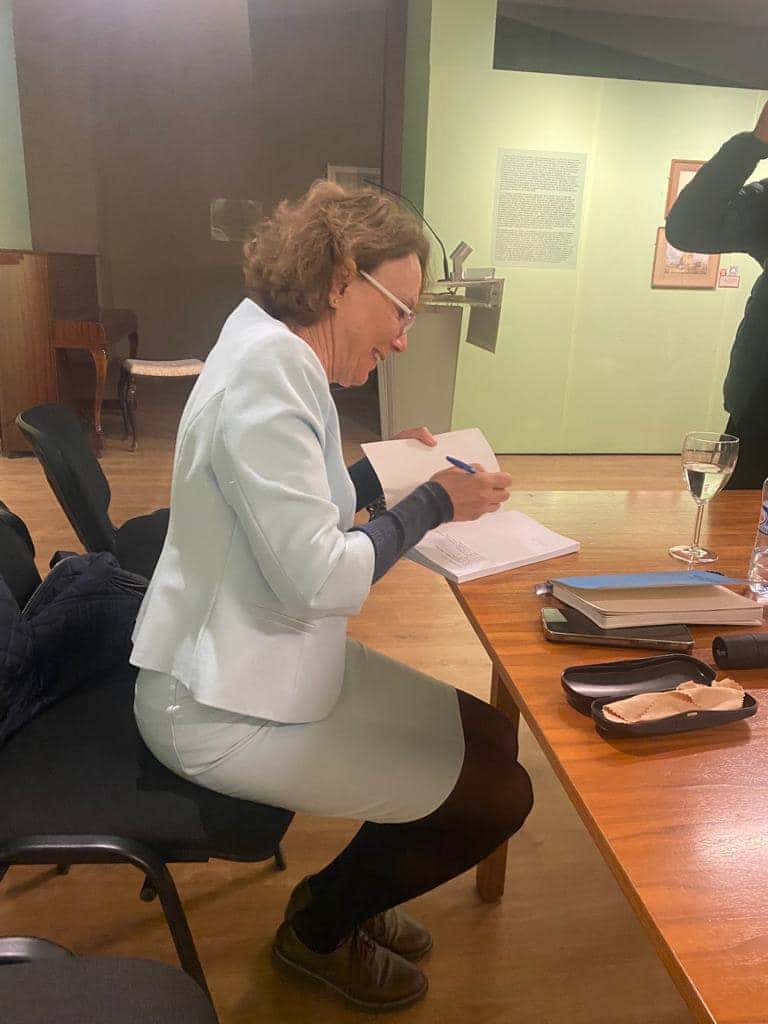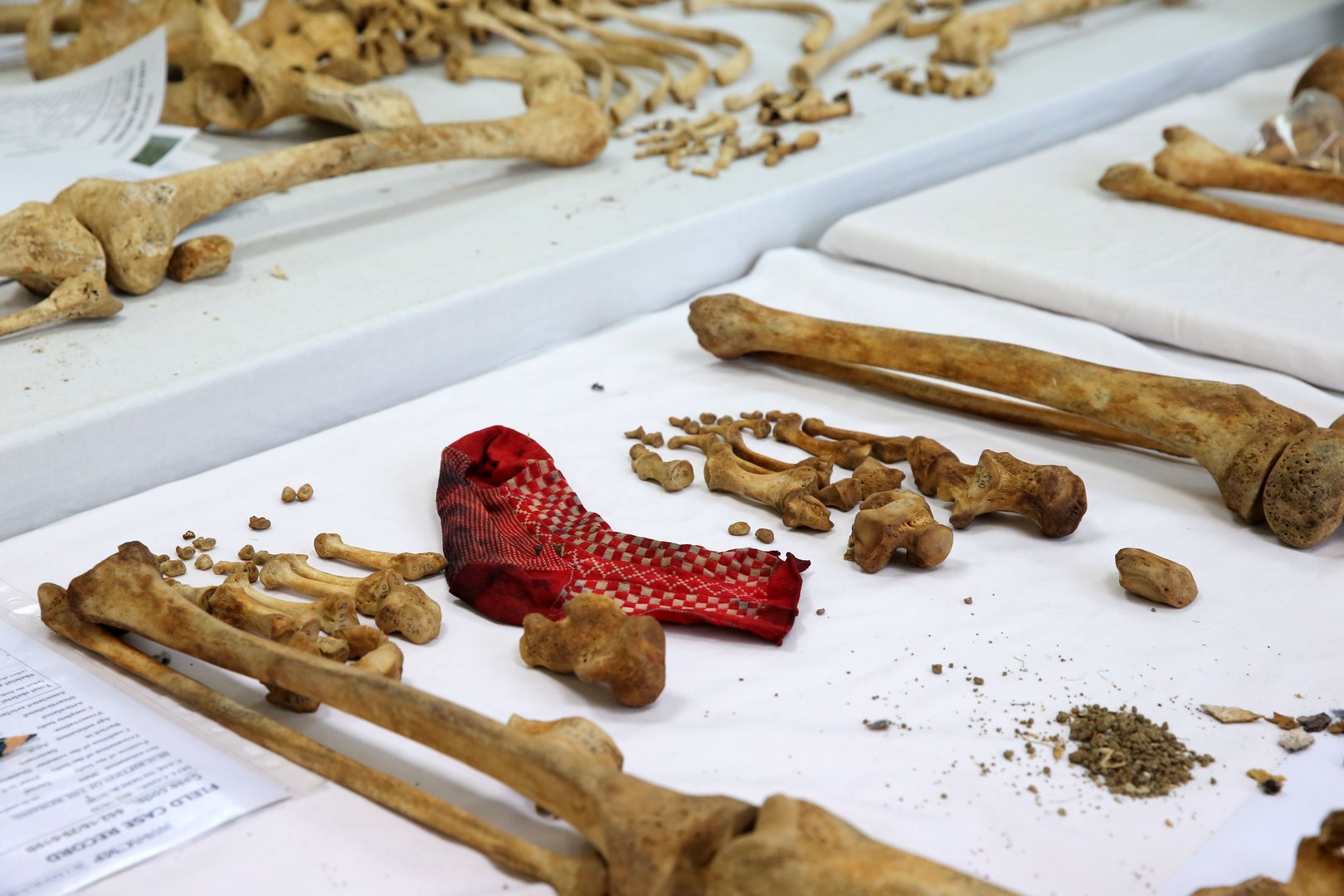New book by the Turkish Cypriot representative on the Committee of Missing Persons
By Nikolaos Prakas
Fifteen years and all the ups and downs, successes and failures come to life in the book They weren’t the only ones that disappeared where Gulden Plumer recounts her time as the Turkish Cypriot representative of the Committee on Missing Persons (CMP).
During her book presentation earlier in the week, Plumer described the process, which she had not initially been ready to face, when for the first time she entered the anthropology lab at the CMP housing the remains of the victims of bicommunal violence that has characterised Cyprus since its independence.
Plumer recounted the realisation of the tragedy as she saw the bones and bits of clothes splayed out on white sheets, ready to be identified.
Plumer said that the magnitude of the tragedy dawned on her, especially when she understood that some of the remains the CMP was tasked with identifying belonged to children.
Introducing Plumer at the event at CVAR were former Greek Cypriot member of the CMP Nestoras Nestoros and daughter of former President Glafcos Clerides, Katie.
Both worked closely with her, and shared in many of the struggles and wins Plumer helped to achieve in her time at the CMP, which is trying to solve a humanitarian issue that has affected thousands of families on both sides of the divide.
Clerides, who was briefly the Cyprus Commissioner on Humanitarian Affairs from 2013 to 2014, expounded on how the Missing issue is humanitarian at its core, but that unfortunately in the Greek Cypriot and Turkish Cypriot community it is always viewed as one-sided.
“The bicommunality is not publicised, and the shared grief is not highlighted,” she said.
Burials from the opposite sides are never reported, leaving room for the Missing issue to fuel nationalist intentions on either side.
“It is politically expedient, to promote enmity,” she said.
Likewise, Clerides spoke about the contributions to the CMP, which are never publicly shared unless the funding comes from some outside body, like an embassy or the EU.
Clerides said that funds from donations at her father’s funeral, which amounted to almost €90,000, were all donated to the work of the CMP.
In her book, Plumer described the difficulty of also getting the project out of its dormant phase as since the establishment of CMP in 1981, exhumations only began in 2006 when Plumer joined.

Gulden Plumer signing her book
Commenting on the reason she wrote her book, Plumer said it is important to have literature to act as the archive for the CMP, and give information on how the bicommunal entity works.
Each side skews the narration of the story of the Missing. According to Plumer this stems from the inherited trauma carried by the humanitarian tragedy of the war [Turkish invasion], the intercommunal violence of the 60s that saw many Turkish Cypriots killed, and the issue of the missing persons at large.
“Traumas and childhood experiences stay with them, even if they grow up. No matter how much you learn or analyse, the fire in your brain and soul will burn to the grave,” she said.
In her writing, Plumer talked about the trauma carried by both communities, and gives an example of how both sides make an example of the violence that extended from the creation of Cyprus in 1960, culminating in the war in 1974.
Regarding the descendants of missing persons, she said: “As I got to know the families of missing persons, I understood better that these experiences, which left a mark on my personality, were very mild after what I had seen and learned in the 15 years I spent on the Committee on Missing Persons.”
Another topic Plumer covers in her book is that of the post-remain identification process, which is widely unknown by members of the public, who solely see burials of missing.
Plumer says that the reactions of the victims’ families was a big wildcard.
She said that sometimes they were accepting of the news of their lost loved one, while other times she and her colleagues could be attacked, being seen as the representatives of state institutions that had failed the affected family for years.
In her book, Plumer says: “First of all, I had to answer questions families would be asking about why we were now searching for their missing person after all these years.”
In some cases they would not take the work of the CMP seriously as the family may have reached out to some of other government institution before the CMP, resulting in no tangible steps being made on the issue.
“As soon as the project started, some families quickly grasped the mechanism and gave immediate support, realising that it was the only way to reach the remains of their loved ones,” she writes.
Some families though fought against the CMP, taking out decades-long frustrations created by authorities that had turned a blind eye.
Speaking about the process of informing the families, Plumer says that after DNA testing the families are shown items found with the remains, clothes or pictures, if they were found, and questions are answered.
Questions she says are further answered with a visit to the family viewing room at the anthropology lab at the CMP.
Since 2006, when the CMP began its exhumation process out of the 2,002 people reported missing, 1,196 have been exhumed, while 1,029 have been identified in total.
Greek Cypriot missing persons number 1,510, and Turkish Cypriots are 492.
The work has been ongoing and exhumations are largely based on details supplied by witnesses, but Plumer said witnesses of the killings are getting older and information can be unreliable. Another tool used by the CMP is by accessing archives from all actors involved, but information at times can be limited due to the methods adopted by the actors outside the CMP.
Access to military areas, where many soldiers or victims of the war are thought to be buried is also limited, with permission granted to the CMP to only search in certain and limited areas.







Click here to change your cookie preferences